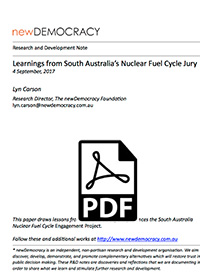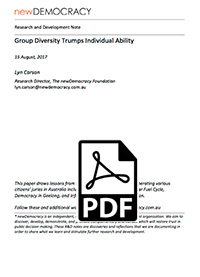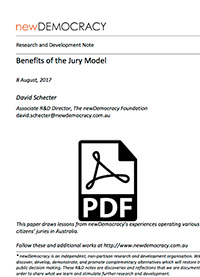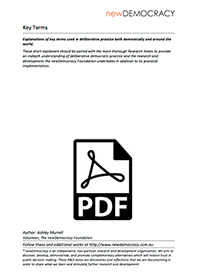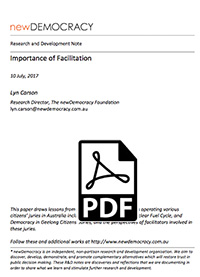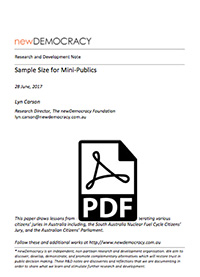September 12, 2017 The arrival of 16 million same-sex Marriage Law Survey forms in post boxes from today is more than just a historic moment in the campaign for marriage equality. It is also the first time in 18 years that Australian voters have been given the chance to “vote” directly on an issue — rather...
Library
Learnings from South Australia’s Nuclear Fuel Cycle Jury
Lyn Carson – Research Director, The newDemocracy Foundation What is the question? In 2016, newDemocracy had oversight of a massive public deliberation in South Australia on the extremely contentious issue of nuclear waste storage. It was our biggest project to date. Any journey into the unknown is a rich site for learning, and this project...
Group Diversity Trumps Individual Ability
Lyn Carson – Research Director, The newDemocracy Foundation What is the question? When assembling a randomly-selected group of people, for example in a citizens’ jury (see, Sample Size for mini-publics), what attributes are most important for the group members if they are to handle complex matters? What are the usual answers? This question is...
Benefits of the Jury Model
David Schecter – Associate R&D Director, The newDemocracy Foundation What is the question? Why use the jury model of random selection and deliberation? Why would public officials want to incorporate the jury model into public decision making? What are the benefits of the jury model, compared to the usual forms of public engagement?
Our Winter 2017 Newsletter
Welcome to our latest update on the pursuit of a better democracy. It has been a busy winter for newDemocracy. Projects are concluding and foundations are being laid for large projects to come. We’ve seen a flurry of international events from Athens to San Francisco. We’ve featured in The Australian, been developing our platforms for interaction, and widening our channels of influence....Continue reading
World Café
‘How can we enhance our capacity to talk and think more deeply together about the critical issues facing our communities, our organisations, our nations, and our planet?’ The World Café: Shaping our Futures Through Conversations that Matter, Juanita Brown, 2005 What is the World Café? The World Café method is a discussion group aimed at...Continue reading
Importance of Facilitation
Lyn Carson – Research Director, The newDemocracy Foundation What is the question? How are the usual challenges associated with working with groups addressed in mini-publics? What are the usual answers? In the political landscape, groups are commonly chaired (in committees) or arbitrated by a Speaker (in parliaments). When citizens are brought together in a public space,...Continue reading
Democracy is broken but we can fix it with real people power: Campbell Newman
I entered politics with an engineer’s mindset — to assess the challenges, then build things to solve those problems. I went into it knowing politics can be bruising, and I was a willing participant in making sure I offered my arguments with the full measure of force and theatre to go along with the underlying...Continue reading
Sample Size for Mini-Publics
Lyn Carson – Research Director, The newDemocracy Foundation What is the question? When convening a mini-public, certain basic parameters must be met: the group should be diverse and inclusive (Landemore, 2012), and it should have time and sufficient information to deliberate well (March & Carson, 2013) (See, Deliberation), and its decisions should be influential. When discussing...
Silvertail subversives: the men aiming to change a system in which they prosper
Meet four men who have prospered hugely under our current political system, yet want to dramatically overhaul it for the greater good. On the cover of Oz magazine’s February 1964 edition three young men – one dressed, incongruously, in a suit – stand at the Tom Bass public sculpture in Sydney’s Hunter Street, pissing into...Continue reading


